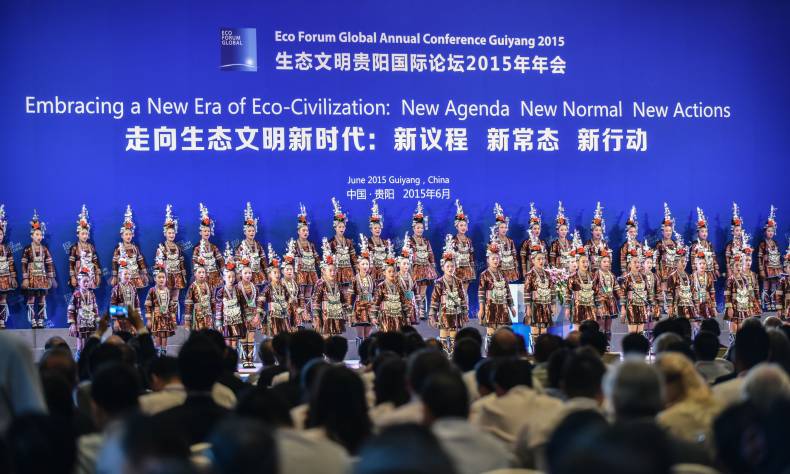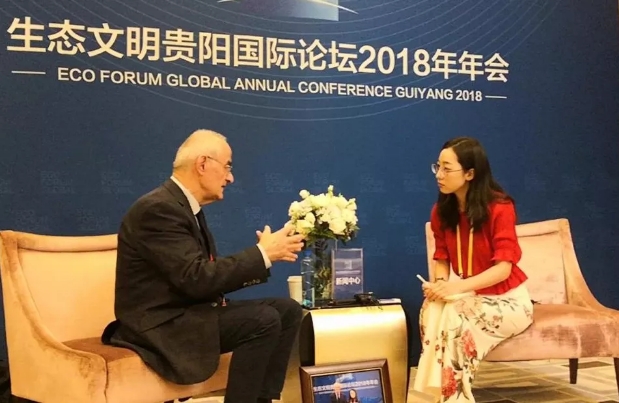
Is Human Civilization Protecting the Environment?
At the beginning of this month, Fanjing Mountain in Guizhou was added to the UNESCO World Natural Heritage list.
At the beginning of this month, Fanjing Mountain in Guizhou was added to the UNESCO World Natural Heritage list. President Xi Jinping extended his greetings to the opening of the Eco Forum Global Annual Conference Guiyang 2018, saying he believed that the annual conference this year was themed “Embracing a new era of eco-civilization: green development with high priority to ecology,” which would help all parties reaching consensus and strengthen cooperation for the development of global ecological civilization.
Eco Forum Global is a non-profit, international high-end platform, aiming at promoting eco-civilization by convening global leaders from numerous government, business, academics, media and civil society. EFG calls for decision makers from diverse sectors to participate in various conferences and activities, organizing different communities to meet the challenges and issues we are facing. This year’s conference has gathered more than 2,400 participants from over 30 countries and regions and involving almost all the top international organizations specialized in environmental protection and green development.
As a special adviser to UNESCO, Čedo Maksimovic has presented his views on the relationship between the ecological system and culture based on EFG and the new member of the World Heritage List. In addition, the Vice President of EarthX — Matthew Myers, has voiced his concern on the present situation and explained the prospect of ecological economy development using the cases from Earth X.
Interview with Cedo Maksimovic
China Focus: How do you view the relations between the ecological system and culture?
Čedo Maksimovic: Culture, like any other human activities, is part of our everyday lives. Unfortunately, human civilization has inflicted serious damage and threaten the environment during the last 200 years, and we are now in a very delicate phase where any further damages might become irreversible. Therefore, we must use all possible means, including culture, education, health, and so on to improve our lives. Among them, culture plays a very important role as it can make us aware that we are part of this beautiful planet and is an open space to implement the philosophy of bringing nature to save our planet, our civilization, and the beautiful lives.
China Focus: My next question is can you give us advice on how to combine these two factors. As you know, several days ago, some experts gathered in Huangguoshu Waterfall and told us we should make another application to the World Heritage List.
Čedo Maksimovic: We have taken part in activities of working with various NGOs, from young organizations to urban culture hubs. Urban culture hubs are entities formed by a group of people with cultural intuitions, in which youths and official government working together to spread the importance of nature and culture. For example, you have an organization in a country that possesses hundreds of events, theaters, and ballet performances. All of them are environmentally friendly and attracting many young people. These young people are then no longer passively looking performances, and instead become part of them. The culture is the medium for spreading this awareness, and meanwhile, these young people will also feel their life becoming much richer. These urban culture hubs do not just look at culture, but also mass media, social network, and all the cultural activities. Yet, at its core it is still a culture, It is a culture, yes, but also much more.
China Focus: Onto my last question: what progresses do you think China has made throughout these years?
Čedo Maksimovic: China has made significant nationwide progress. We all know how China looked fifty or sixty years ago, and it has since made huge progress in developing economy, culture, education and so on. So it is now a good time to put the future development on the basis of a healthy environment, which is something already recognized by the Chinese leadership and more concrete projects are now being made. I’m eager to work with my Chinese colleagues in making them happen.
Interview with Matthew Myers
 China Focus: Can you introduce us briefly about your company, Earth X?
China Focus: Can you introduce us briefly about your company, Earth X?
Matthew Myers: I’ve come here after creating an environmental expo in Texas, the center of America. After 8 years of buildup, we are now ten times larger than any other public environmental event in America.
Earth X is an exhibition of 700 organizations, 11 conferences, a film festival of 33 green documentaries, 35 virtual reality films, a series of 400 green speakers. And instead of TED talk, we call it Earth Day Texas talk. So again, we hope that China will come next April, and bringing with its cities, provinces, and people. April 22 is the Earth day, and our event will last about 6 days. We wish China can have a China pavilion to display the issues, and most importantly the progress that it has made. China hasn’t been bragging enough, you see, and in Texas we tend to brag a lot.
China Focus: So after seeing all the changes in China, are there any ways you would like to cooperate with China so as to create a better economic system for us both?
Matthew Myers: That is precisely what we are here for – to collaborate with China and identify what images to be shown to America, and I would call this a debut. I also wish that Chinese officials, executives, and NGO leaders could all come and meet their counterparts throughout America in Dallas, Texas.
China Focus: Do you think both China and the US possess their own unique advantages, which they can learn from each other?
Matthew Myers: Of course, the technology that China has to learn from America is still out there, and now we have to learn technical things in China too. For the Chinese part, you know, what the west should learn is that nature is one. In the West we see a division of mind and body, economy and ecology. In China, for maybe a brief moment, that has been forgotten but now it is turning around and resuming the eastern way of thought. And that is what we have to learn.
Interviewer: Liana
Editor: Zheng Nan
 Facebook
Facebook
 Twitter
Twitter
 Linkedin
Linkedin
 Google +
Google +



